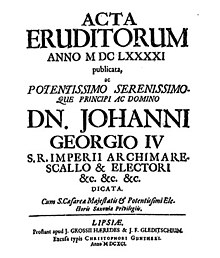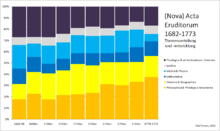Acta Eruditorum
The Leipzig journal Acta Eruditorum ( Latin for "Negotiations of the Scholars"), founded in 1682 , continued from 1732 to 1776/1782 under the title Nova Acta Eruditorum ("New Negotiations of the Scholars"), was the most important among the Germans in the late 17th century established general scientific journals .
Gottfried Wilhelm Leibniz had proposed a first German journal project to the Kaiser in Vienna in 1668, at the time impressed by the Journal des sçavans , which had appeared since 1665 and which did not give German scholarship the status that could be gained with an international project written in Latin. The Miscellanea Curiosa , the publication of which began in 1670, became the first important German scientific organ, but remained limited to its specialty, medicine, while in England the Philosophical Transactions and in Italy the Giornale de 'Letterati the large projects of international and general scientific journals were.
The foundation of the Leipziger Acta followed under these premises in the special interest of representing German scholarship internationally. The first editor was Otto Mencke . The publishing house was shared by the companies Grosses Erben (who also published the Frankfurt and Leipzig fair catalogs ), Johann Friedrich Gleditschs and, for a time, Thomas Fritschs , which ensured the connection of the magazine to the central publication location in Germany and the most important local publishers. At the same time Mencke managed a wide correspondence. Scientists of international renown were won over to write reviews for the journal, which was financially supported by the Saxon King . Initially, around 50% of the original articles were added to the reviews: small academic papers that used the new format for publications that remained far below the limit of an independent publication. At the beginning, Acta's contributions had an average length of two to three pages. The editors broken it down in the table of contents into six headings, under which the legal writings remained underrepresented.
- Theologica et ad Ecclesiasticam Historiam spectantia (1682: 19.8%)
- Juridica (1682: 8.6%)
- Medica et Physica (1682: 26.7%)
- Mathematica (1682: 17.1%)
- Historica et Geographica (1682: 12.8%)
- Philosophica et Philologica Miscellanea (1682: 15.0%)
The scientific contributions initially made up almost 44%, an enormous part of the spectrum compared to the total output of the book trade in this sector. The numbers that could be given in 1682 changed over the course of the 1680s: Theology made up 27% of the articles in the first decade of the journal.
During the entire course of the publication, the focus shifted until the 1770s. As in the book market, theology lost market share, historical and geographical writings increased and over the course of the year came to over 55% of the contributions. The natural sciences and mathematics essentially stayed the same.
The reviews concentrated on reproducing content - competing organs specialized in opinion-based reviews and value judgments from the 1690s. In the Acta, on the other hand, as late as the 1690s, chapters and page references were given in the margin of the respective review in order to make it clear to the reader where in the reviewed book he found which information summarized here. Copper from the fields of medicine and mathematics was used in particular.
The numbers of initially 32, in the 1750s the regular 64 pages, appeared monthly, in the middle of the 1760s temporarily bimonthly due to the war. Two-year volumes were consequently published in 1764/1765 and 1766/1767. With the respective annual volume, one received double registers and through this access to the presented knowledge. Separate supplements have been published for the annual volumes. The project, including the name change in 1732, has the following publication history:
- Acta Eruditorum (1682–1731)
- Actorum Eruditorum Supplementa (1692–1734)
- Nova Acta Eruditorum (1732–1776 / 1782)
- Ad Nova Acta Eruditorum Supplementa (1735–1757)
The editorship remained in the family for a long time. Johann Burckhardt Mencke ran the company until 1731 after the death of his father. His son Friedrich Otto Mencke modernized the name to Nova Acta Eruditorum. The design remained true to the editions of the 1680s, but actually printed considerably fewer articles, which, however, grew in volume. The reviews of the 1750s are on average 5 to 6 pages long and often continuous condensates of the books discussed. In 1754 Professor Karl Andreas Bel took over the publication. The magazine was discontinued with his death in 1782.
As a German-language counterpart, but independent of the Acta Eruditorum in terms of content, the German Acta Eruditorum was created in German in 1712 . In particular, they discussed historical writings and current controversies. They are not translations of the Latin Acta Eruditorum.
literature
- Detlef Döring : Acta eruditorum. In: Klaus-Dieter Eichler , Ulrich Johannes Schneider (ed.): On the everyday history of philosophy in Leipzig. Leipziger Universitäts-Verlag, Leipzig 2004, ISBN 3-86583-029-3 , pp. 32–33 ( Leipziger Schriften zur Philosophie 18).
- Joachim Kirchner. On the genesis of Acta eruditorum. In: Archives for the book trade and commercial graphics. 65, H. 4, 1928, ZDB -ID 6341-1 , pp. 75-88.
- Augustinus Hubertus Laeven: De "Acta eruditorum" onder redactie van Otto Mencke (1644–1707). De geschiedenis van een internationaal leererdenperiodiek tussen 1682 en 1707. Holland University Press, Amsterdam et al. 1986, ISBN 90-302-1013-3 ( Studies van het Instituut voor Intellectuele Betrekkingen tussen de Westeuropese Landen in de 17th Eeuw 13), (At the same time: Nijmegen, Univ., Diss., 1986).
- Augustinus Hubertus Laeven: The "Acta Eruditorum" under the editorship of Otto Mencke (1644-1707). The history of an international learned journal between 1682 and 1707. APA-Holland University Press, Amsterdam et al. 1990, ISBN 90-302-1296-9 ( digitized version ) - English with a German summary.
- Augustinus Hubertus Laeven, Guillaume van Gemert: De Acta Eruditorum as invalshoek voor de noornederlandse. In: Documentatieblad Werkgroep Achttiende Eeuw. 53/54, 1982, ISSN 0166-6304 , pp. 85-117.
- Gottfried Wilhelm Leibniz : La naissance du calcul différentiel. 26 articles of the Acta eruditorum. Introduction, traduction et notes by Marc Parmentier. Vrin, Paris 1989, ISBN 2-7116-0997-9 ( Mathesis ).
See also
Web links
- Database of the University of Wuppertal (with the option to research the articles and reviewed literature) under the rubrics “Medica / Physica”, “Mathematica” and “Miscellanea” (without “Theologica”, “Juridica” and “Geographica / Historica”).
- Digitized editions of the SUB Göttingen.
- Digitized editions at gallica.

